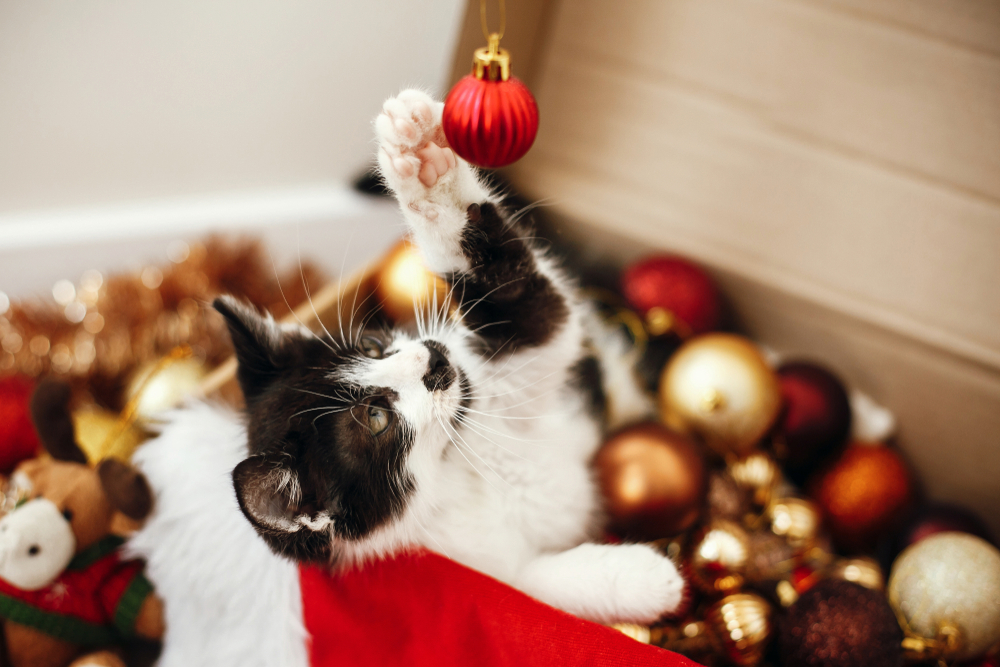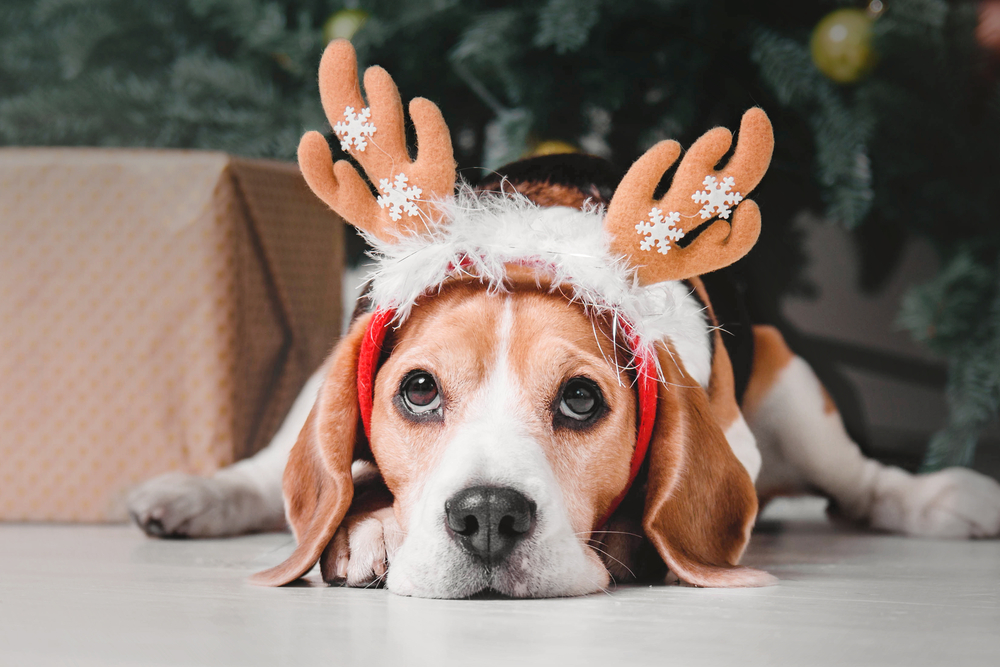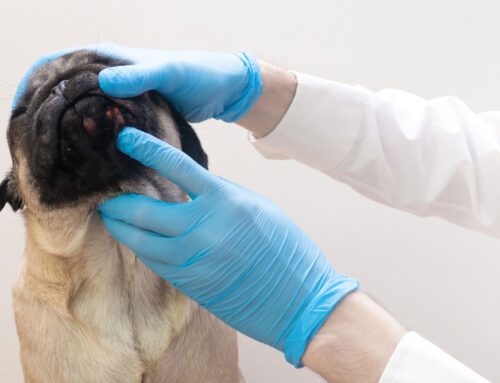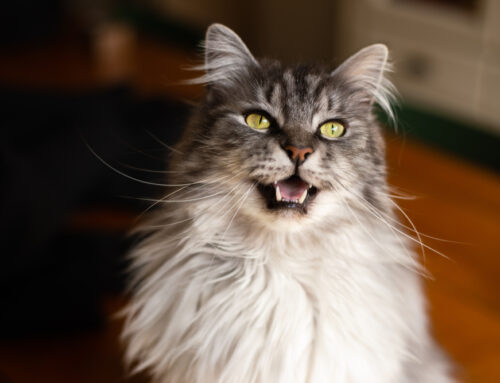If you weren’t already tipped off by the festive decorations and the endless loop of cheerful carols, the holiday season has arrived. And whether you’re cringing under the impending weight of familial guilt or bubbling over with the holiday spirit, you’ll want to ensure that you and your furry friend survive the “most wonderful time of the year” with your peace, health, and good humor intact.
So, grab your overbaked sugar cookies and come dash through the artificial snow as Palisades Veterinary Hospital takes you on our annual pet holiday safety tutorial.
Stocking stuffed—pets and holiday food
The holiday kitchen is no place for pets. In all honesty, it’s not always a safe place for family members. However, unlike Aunt Rosa, your pet knows what “The Look” means.
Pet kitchen holiday mishaps are common, because curious canines and cats milling about can cause their owners to trip and fall, spill food, or drop sharp utensils. Hungry hounds are notorious for stealing festive foodstuffs—some of which may be toxic—from countertops, tables, trash cans, and inattentive or overly indulgent guests.
Keep pets confined behind a barrier or in a crate during busy times, and ensure these harmful foods never pass their whiskers:
- Raw or cooked meat bones
- Turkey fat, skin, or gravy
- Undercooked meat
- Ham
- Grapes or raisins
- Onions, chives, leeks, or garlic
- Chocolate
- Sugar-free foods containing xylitol
- Macadamia nuts
- Alcohol
- Caffeine
- Yeast dough
However, you can feel safe offering your pet some healthy non-toxic alternatives, if you ensure each food is in its plain (i.e., no sauce or seasoning) whole form. Consider filling a hollow toy (e.g., Kong or West Paw Toppl) with a festive flavor to preoccupy your pet during the big meal. Your pet’s holiday menu can safely include:
- Skinless white meat turkey
- Baked sweet potato
- Apple slices
- Carrots
- Pureed pumpkin
- Cooked cranberries
- Green beans
- Broccoli
- Peas
- Plain low-fat yogurt
- Corn kernels (i.e., no cob)
If your pet does consume a harmful or toxic food item, you’ll need to estimate how much they’ve ingested and the time of occurrence. If applicable, gather any packaging or wrappers and contact Palisades Veterinary Hospital during normal business hours, or call the nearest veterinary emergency center or Animal Poison Control for overnight and after-hours attention.
Oh, Tannen-bomb—don’t let pets crash your Christmas tree

Your pet won’t snub their nose if you dare to display an artificial tree, nor will they call you out for chopping down a live one—they will be simply elated that a towering timber has suddenly appeared in their home. And, the pretty pine tree being adorned with twinkling lights, sparkling garland, and toy-like ornaments doesn’t hurt.
Tree-related troubles are common at Christmas. You may be able to laugh about your pet lifting their leg to “water” the tree, but serious injuries, such as electrocution, paw or mouth lacerations, intestinal blockages, and gastrointestinal upsets, are a real pet threat.
Protect your pet—and your tree—with these extra special holiday precautions:
- Supervise your pet at all times around the tree.
- Secure your tree to the wall or ceiling to prevent tipping.
- Use cord protectors to prevent chewing and potential electric shock.
- Unplug any lights or extension cords before leaving a room.
- Hang precious ornaments up high to prevent theft or breakage.
- Restrict your pet’s access with an exercise pen or pet gate.
- Cover the tree base to deter pets from drinking the water, which may contain trace fertilizer amounts and harmful bacteria.
Ho ho, oh no! Supervise pets around holiday decor
You may have hung the stockings on the chimney with care, but your pet won’t show as much consideration. Natural curiosity, boredom, stress, and hunger can motivate your pet to steal Christmas with a few whacks of their paw and shakes of their tail.
Keep an eye on your pet around these traditional decorations to ensure your holiday stays picture perfect:
- Candles and fireplaces — Like moths to a flame, many dogs and cats find flickering light enticing, move in for a closer look, and suffer singed whiskers and burned paws. Worse—happy tails and wagging hind-ends can knock candles from tables and send your holiday and home up in smoke.
- Garland and tinsel — Cats love to chew on string decorations but, unfortunately, their intestines can accordion around linear objects, resulting in tissue death. Emergency surgery is necessary to remove the item and repair the intestines.
- Essential oils — Many oils and liquid potpourris are pet-toxic when inhaled or ingested.
- Glass ornaments — Broken ornaments can cut paw pads or cause painful oral lacerations.
Give and take away—problematic pet presents
Pets are easy to shop for, right? Unlike ungrateful Uncle Dan, they’ll show at least a passing interest in their gifts. Unfortunately, many popular pet gifts can haunt you—and your pet—like the ghost of Christmas past, including:
- Rawhide rolls, chews, or “lollipops” — These festively shaped and colored treats are made with harmful chemicals and frequently result in choking or intestinal blockages.
- Gourmet treats — Unfamiliar ingredients can set off an explosive gastrointestinal upset that rivals your holiday fireworks show.
- Plastic squeaky toys — Inexpensive plastic toys that your power-chewing pet can easily dismantle and consume may contain dangerous chemicals. Opt for flexible but resilient rubber toys made by Kong, GoughNuts, and WestPaw.
- Meat bones — Never regift your leftovers. Cooked bones can splinter and break, resulting in fractured teeth, pancreatitis, or life-threatening punctures or intestinal blockages in your pet.
The holiday season can be a mixed Santa’s bag of emotions, but when all is said and done, you still have the greatest gift of all—your pet’s unconditional love. Repay that kindness by protecting their health and safety and maintaining their care at Palisades Veterinary Hospital. From our two- and four-legged family to yours, happy holidays.







Leave A Comment